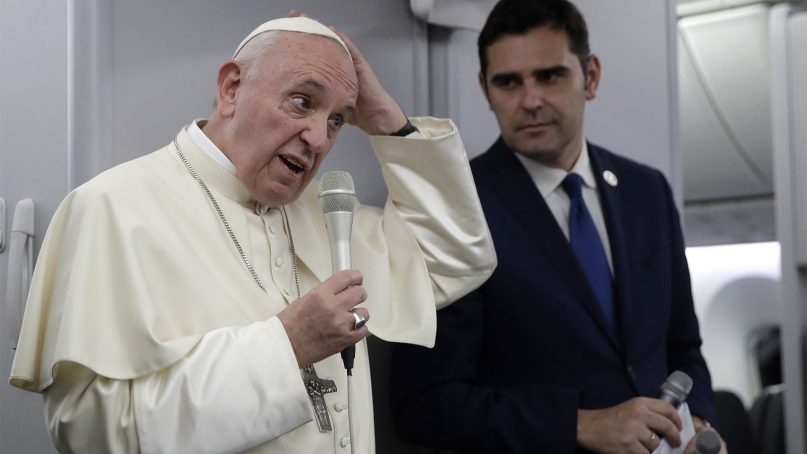On his flight home from Panama last week, Pope Francis told reporters he wanted to deflate what he perceived to be “inflated expectations” about the summit for presidents of bishops’ conferences on clerical sexual abuse to be held in Rome later this month. As far as I can see, however, the media’s expectations have been anything but inflated.
Back on December 9, for example, Crux’s John Allen wrote a column headlined “A reality check on expectations for February child abuse summit.” Or take my RNS colleague Tom Reese, who stuck in the needle a couple of weeks ago with “Five Reasons the pope’s clergy sex abuse meeting will fail.” Ouch.
Still, I’m sticking with my hopeful scenario. I predict that the meeting will move the Church significantly forward in dealing with the greatest challenge to its moral credibility since the Reformation.
For starters, let’s note how the pope himself explained what he meant by needing to puncture inflated expectations: “Because the problem of abuse will continue. It’s a human problem.”
Well, sure. If anyone imagines that a four-day meeting at the Vatican will put an end to all sexual abuse by priests and others in responsible positions in the church, they need to be disabused.
So what did Francis say will take place at the meeting?
First, the heads of the bishops’ conferences will be given a “catechesis” in child abuse. They will, in other words, be instructed in the nature and consequences of sexual abuse the way the Catechism of the Roman Catholic Church lays out church doctrine.
Then they will receive a set of “protocols” for dealing with abuse cases. These will set the terms for “general programs” that each bishops’ conference will develop to address abuse, including “what the bishop must do, what the archbishop who is the metropolitan must do, what the president of the episcopal conference must do.”
“But,” said the pope, “it must be clear in that…that they are—let’s say it in terms [that are] a little juridical—that there are protocols that are clear. This is the main thing.”
Finally, the bishops will “pray, listen to witness and have penitential liturgies, asking for forgiveness for the whole Church.”
The protocols, then, are where the rubber hits the road, and my guess is that one of the reasons the Vatican told the U.S. bishops to delay voting on policy governing episcopal conduct at their meeting in November is that this was not—indeed, could not be—formulated to comply with them.
Whatever, I expect there will be plenty of rubber. The four-person planning committee includes Archbishop Charles Scicluna, the tough Maltese who conducted the investigations that brought down Marcial Maciel Degollado, the predatory founder of the Legionaries of Christ, and led to the dismissal of a number of Chilean bishops. He, along with German Jesuit priest Hans Zollner, director of the Center for Child Protection of the Pontifical Gregorian University, Cardinal Blase Cupich of Chicago, and Cardinal Oswald Garcias from India, are not ones to mess around.
Will the protocols instruct the bishops’ conference on dealing bishops who cover up and otherwise mishandle abuse cases?
That’s the critical issue, at least in this country, where the scandal began 30 years ago. It’s the issue on which Francis has thus far most clearly fallen short, ordering up juridical processes that the Roman curia has succeeded in preventing from taking place.
These were noted in a long article in the Jesuit journal Civilta Cattolica by Federico Lombardi, S.J., the former head of the Vatican’s press office who was recently named to serve as moderator of the summit.
The Motu Proprio As a Loving Mother of June 4, 2016, is a significant step for facing the particularly complex problem—continually raised in public discussion, especially in the United States—of the accountability of ecclesiastical authorities, that is, of the procedures to put into place for bishops accused not of crimes of abuse on minors (these are in fact already the concern of the Congregation for the Doctrine of the Faith, following previous mandate of the Holy Father), but of seriously inadequate behavior concerning cases of abuse (for example, hiding it).
Calling on the church to fully confront the crisis, Lombardi went on to say, “What must be opposed decisively is the tendency to protect yourself and the institution of the Church by fleeing difficult, uncomfortable situations, minimizing or even hiding the truth.”
When it comes to hiding the truth, the church’s central rationale has been the avoidance of scandal—not merely in the ordinary sense of the phrase but by way of a theological doctrine dating back to the Middle Ages. The latter goes so far as to mandate covering up ecclesiastical malfeasance on the grounds that making it known will weaken the faith of the community of believers. Again and again, the abuse files show church officials explaining their self-protective behavior by citing the need to avoid scandal.
In his most recent Christmas Address to the curia, Francis addressed the doctrine head on. “Even if it were to involve a single case of abuse (something itself monstrous),” he said, “the Church asks that people not be silent but bring it objectively to light, since the greater scandal in this matter is that of cloaking the truth.”
The doctrinal significance of this pronouncement should not be missed. And if the concept of “the greater scandal” is embedded in the protocols, the church will take a major step in the right direction. I’m optimistic that it will.






